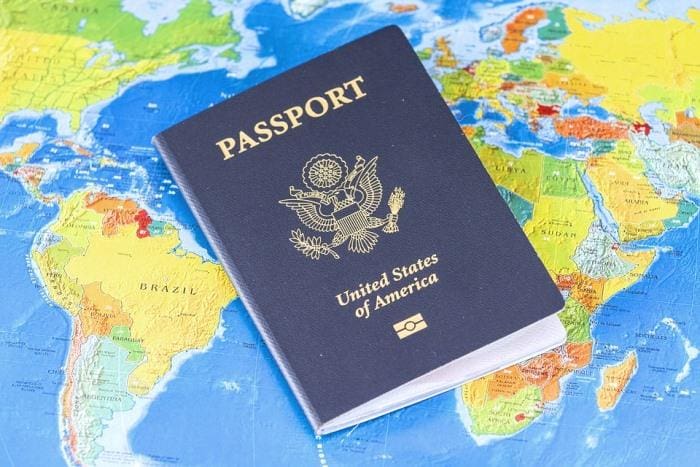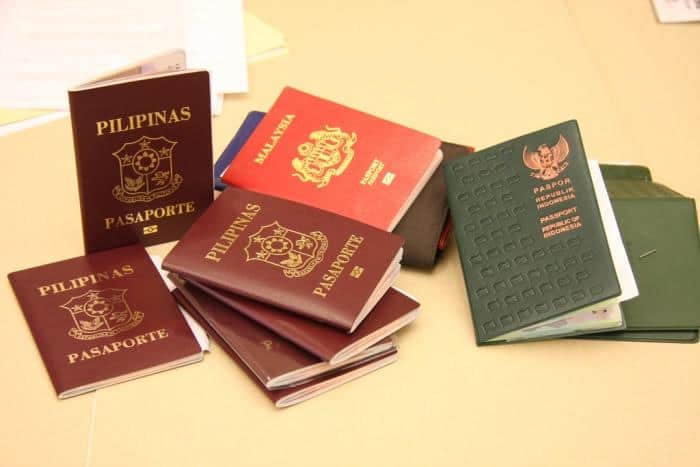Be Aware of Second Passport Myths, Scams and Black Market Deals
November 21, 2022
Dateline: Bangkok, Thailand
While it’s not my cup of tea, many people consider Thailand to be a great place to live.
It has all of the things people talk about when they’re trying to sell you on where they live: the big city, quiet towns, and a limitless supply of amazing beaches.
But one thing is for sure: Thailand is not a good place to get a second passport. I don’t say this out of my dislike for the country, you simply cannot get a second passport from Thailand.
None of the four different methods work. And, even if you could somehow obtain Thai citizenship, Thailand does not allow dual citizenship.
Yet, you will still likely find a few folks here and there who are convinced that if they live in Thailand just a few more years, they will qualify to become a naturalized Thai citizen.
Here’s to the wishful thinkers of the world.
We talk about the concepts of flag theory and second passports on a regular basis here on the Nomad Capitalist blog and YouTube channel, but I have found that many people still believe certain myths about second citizenships. Or, like the folks still wishfully waiting in Thailand, they simply make the wrong assumption or misunderstand how the system works.
Knowing how to get a second passport is actually relatively straightforward when you cut through the clutter, but you can run into a lot of misinformation out there that will clutter up your path.
For instance, I recently read an article where the author called second passports a bunch of “scam artist bull.” He said that if you qualify for a second passport, you would “likely already know it” and you wouldn’t need sites like this to help you.
This, of course, couldn’t be further from the truth. Consider just how statistically small our group is – a group of people who actually realize the importance of having a second passport – and you’ll quickly realize just how many people don’t even know they can have a second passport, let alone that they qualify for one.
To clean up some of the clutter out there, let’s address some of the biggest myths created by the nay-sayers, and the misinformation produced by well-meaning folks who just don’t know enough to adequately discuss the ins-and-outs of what it takes to obtain a second passport.
Myth #1: You Must live in a Country for a REALLY Long Time to Get a Second Passport

Like many myths, the myth that you have to live in another country for a really long time in order to qualify for citizenship is based on a little bit of truth. In some countries, you do have to be physically present for a very long time before they will give you a second passport. Tina Turner renounced her US citizenship a few years back after obtaining Swiss citizenship, a process that took at least twelve years of on-the-ground residence to obtain.
And in Andorra, the wait is twenty years… if you have the low six-figure deposit to get residency there in the first place.
However, with more than 200 sovereign countries and territories, there is no need to wait around to be naturalized in a place like Switzerland or Andorra. There are numerous countries that offer citizenship programs that require much less of you, including how long they expect you to live there.
Getting a second passport within your desired timeline is all about planning. If your goal is to obtain a second passport within a relatively short amount of time, you would be ill-advised to move to a place like Andorra or Switzerland in hopes of getting one.
While you might love Switzerland, you could get the same European living with a much shorter timeline by going to a place like Belgium. The naturalization timeline in Belgium can be as short as five years and Belgium is a charming country, the cost of living and immigration fees are much less expensive, and you will still enjoy free access to the entire Schengen area of Europe in which to travel while you wait – including Switzerland.
Another option in Europe is Ireland, where they offer residency to investors and entrepreneurs, with the promise of a passport (or at least the chance to apply) after five years.
In Paraguay, the timeline to naturalization is just three years, making it the fastest country where you can get citizenship through naturalization right now. The Paraguay government seems to like that distinction.
Can you get a passport after living somewhere for six months?
No! But did you really think you could?
The most common exceptions to this waiting game are countries that allow their citizens to bring a non-resident spouse into the country as a legal resident, which can sometimes shorten the period required for citizenship.
For example, non-resident spouses of Belize citizens can enjoy a shortened waiting period of only one year rather than the usual five. Similarly, Brazil is one country that offers fast-track citizenship to those “responsible for a Brazilian child.” That’s why my friend Neil Strauss wrote about “Why you should knock up a Brazilian chick” in his excellent book, Emergency.
The biggest problem with the waiting game is that countries like Singapore are realizing what they’ve got and they are making it harder to obtain a passport.
That’s why I’m always on the lookout for the “next big place” where you can get in before the government gets uppity.
If your goal is to get a second passport, your best bet is to establish a second residence now, as desirable countries keep making it harder and more expensive to claim their citizenship. I expect that to continue as more and more wealthy Chinese and Russians build escape hatches from their countries.
Myth #2: Canada Has an Economic Citizenship Program

There is an important distinction to be made between naturalization and economic citizenship programs that many people just don’t understand.
At one point, Canada had an immigrant investor program whereby you could start a business or effectively loan money to the government in exchange for residence.
Under this program, after several years of living in Canada 75% or more of the time (they rigorously count every day), you could apply for citizenship. Such second residence programs are not the same as economic citizenship programs where you immediately get a passport.
Economic citizenship programs are run by smaller countries, such as St. Kitts and Nevis, who accept a donation to the government in exchange for citizenship (after a background check). You don’t have to live there, or in the case of St. Kitts, even set foot there.
Canada has no such program. Canada grants residence first, not citizenship.
Canada’s residence program also requires you to reside in the country for a decent amount of time, while economic citizenship programs do not. It is important to know the difference between relatively instant economic citizenship opportunities that come with a second passport and immigration programs where the prize is the chance to live in a country by starting a business or buying bonds.
Merely being a resident – even a permanent resident – of a country does not guarantee citizenship. You may be able to eventually apply for citizenship by meeting naturalization requirements, but residency does not guarantee that citizenship will be granted.
Myth #3: Having a Second Passport Is All About Ease of Travel

While everyone’s reason for having a second passport varies, I believe that it is a great diversification tool. After all, your home government effectively owns your citizenship. They decide if you’re eligible for a passport to even leave in the first place.
Yes, it’s best to get a second passport that offers great travel opportunities, but that’s not all a second passport is good for.
We have discussed before how the Cambodian second passport could be useful for making investments in Cambodia, however, it’s less useful for traveling the world.
That is, if you can even get it renewed (Cambodia has no official law allowing for citizenship by investment). Cambodians enjoy visa-free travel to very few countries, which means that using a Cambodian passport to travel will have you spending a lot of time waiting for bureaucrats to issue you a visa. That said, having a “Plan B” – the very reason to obtain a second passport in the first place – isn’t all about the value of a travel document.
If you can get a legal, white market passport in a less than desirable country, do it so long as it doesn’t require you to renounce other citizenships or cause you undue harm.
In short, get the best second passport you can, and get any that are available to you. Even passports offered to those with ancestors from a country can be rescinded at any time.
Once you have that second passport in hand, you’ll know you have a Plan B to protect yourself and your money from whatever comes down the pike: capital controls, high taxes, lack of freedom of movement… you name it.
Myth #4: You’ll Be Looked Down Upon for Having a Second Passport

I have no idea where this myth comes from. But honestly… who cares? While I can’t speak for the loonies in Washington, DC who believe that anything you do to escape their grasp is “unpatriotic,” I can tell you that the rest of the world doesn’t really care what nationality you are.
Americans make up about four percent of the world’s population, and not being one doesn’t really matter to most people. I constantly hear from expats who trip over themselves to tell me that they “used to be from America,” as if it’s an impressive feat.
I frequently tell people I’m Norwegian or Lithuanian. It started as an interesting social experiment to see what people would say and have some fun claiming my ancestral ties. At 6’4″ and with blond hair, I could easily pass as Norwegian or Lithuanian.
However, I’ve started pushing the envelope a bit and telling people that I’m from Malaysia or the Comoros Islands. No one bats an eye. Because they don’t care. And when it comes to investing and banking, the doors will open much wider for you if you’re NOT an American.
The US government has made so many laws – de facto capital controls, really – that a lot of foreign businesses would rather avoid doing business with US persons entirely.
In that regard, having a second passport can actually get you better treatment in many cases, especially if you give up your US citizenship and free yourself of the regulations that keep piling on no matter who is in power.
Myth #5: A US Passport Is the Most Valuable Passport in the World

Statistically speaking, this is untrue. The most valuable passport in the world is more likely to be from Finland or Germany on any given year.
And if you use the Nomad Passport Index, the top spot actually goes to Sweden. Like many other measures, American propaganda has made it seem as if the United States is number one, when in reality it’s actually tenth or twenty-third or thirty-second. Yes, having a US passport gives you the ability to travel visa-free to many countries.
However, it also excludes you from several countries and could put you in greater danger during an emergency.
More importantly, it limits your overseas investment opportunities. If you’re content to invest in a stock market driven up by funny money, run a business that plays by a laundry list of regulations, and pay half of your income in taxes to fund overseas wars, then by all means, stay in the United States.
If you believe the US government is your best ally, you may not want a second passport.
But if you want to take advantage of economies that are growing at a faster clip than 1%, that US passport may deprive you of the chance.
Myth #6: Having a Second Passport Is About Scamming People or Being a Criminal

If your country allows dual citizenship, there is nothing criminal about having a second passport. It is 100% legal and you should have absolutely NO reason to use it to scam your way into anything.
The point of a second passport is to increase your international diversification and minimize sovereign risk. It’s getting harder to get one in some countries because countries are trying to kowtow to Big Governments like the US and keep certain nationalities – especially from the Middle East – out.
While I don’t suggest you take out a full-page ad promoting your newly-obtained second passport, there will be times when you may have to disclose it to certain agencies.
And I don’t suggest you lie.
Getting a second passport isn’t about being Jason Bourne (sorry, Tim Ferriss) and breaking international law. Rather, it’s about having a legal escape hatch that allows you to leave your own country when the stakes get too high.
Myth #7: Only “Banana Republics” Issue Second Passports

This is false. The cheapest way to get a second passport is through your heritage and plenty of European countries offer ancestral citizenship to those willing to fill out some paperwork and pay some fees. Yes, it’s a bureaucratic process as with anything else involving government, but it’s worth it.
If you have Irish, Italian, Polish, Lithuanian, or British ancestry, or you are Jewish or have a Jewish parent, you could qualify for some of the most common citizenship programs right now. Spain and other Latin countries have made similar offers on a limited-time basis before, as well.
I wouldn’t exactly call Ireland a “banana republic.” The fact that there are more than 14 million Irish passports in circulation, despite a much smaller population in Ireland, speaks to the fact that it is possible to get citizenship through your ancestry.
Unless, of course, your ancestors are from a banana republic, in which case you might want to go for an economic citizenship program in Europe like Cyprus or Malta.
Myth #8: Every Country Will Naturalize You

Some people go the opposite direction from Myth #7 and, instead of thinking that there is only a select number of countries that hand out passports, they believe that every country will grant you citizenship if you live there long enough.
This is false as well.
Many countries in Africa and Asia do not naturalize foreigners at all, for example. But even in countries with citizenship programs, there are several reasons why you may struggle to obtain a second citizenship and passport.
The following are the top three reasons:
1. Ethnic Prerequisites
There are countries that have a history of not naturalizing people based on their ethnicity, despite having programs that grant citizenship to foreigners.
For example, there are some people who claim that if you become a resident of Greece through their real estate investment program, you can become a Greek citizen after seven years of continuous residency. Generally, however, Greece does not naturalize people who are not of Greek origin.
That has been their recent position and it would be terrible to waste seven years living in the country only to find out that you are not “Greek enough” to become a citizen. I wouldn’t take the chance.
Bulgaria, historically, has had issues with the same thing. I have had people who have done Bulgarian residence and I’ve told them that they can get permanent residence if they go out and hire at least ten people in Bulgaria. Ostensibly, you can get a passport in as quickly as three years through this program. The challenge is that Bulgaria generally only likes to naturalize people with some sort of Bulgarian ancestry.
The paradox is that even if you have Greek or Bulgarian blood, you would likely be better off obtaining citizenship by descent in these countries rather than through one of the residency/naturalization programs. While the process to obtain citizenship by descent is a bit slow and cumbersome, it doesn’t require a big investment or that you hire ten people.
So, while it’s more likely that someone whose father was Bulgarian will obtain Bulgarian citizenship by hiring ten people and becoming naturalized versus someone who is not ethnically Bulgarian and just does the program to get naturalized, the ethnic Bulgarian would be better off going the ancestral route.
For this and other reasons, I believe that most countries will realize that this practice kills their competitive advantage. There is so much competition for investment immigration these days that these countries are going to have issues if they don’t naturalize people who have met the conditions.
That said, if you just go and live in countries like Bulgaria right now expecting to become a naturalized citizen, you may be in for a big disappointment. If you’re not meeting a bunch of criteria – namely, being ethnically Bulgarian, Greek, etc. – they won’t necessarily want to naturalize you, even though they “say” they will.
2. Government Inefficiency
Other countries will fail to naturalize you, not because they have any particular objection to you becoming a citizen, but simply because of inefficiency. This is an issue that I have mentioned before, often using Panama’s Friendly Nation’s Visa as an example.
They say that you can get a second citizenship in Panama in five years through this program, but it doesn’t always play out that way.
Many Americans – those who read all the websites about retiring overseas, or the offshore websites written by armchair expats – see Panama as a great (and easy) option. A couple years ago, this was partially true; Panama was still easy enough to deal with. Now, however, there are so many people promoting it that they are really starting to slow down.
In one case, some married friends of mine have lived in Panama for almost two decades and have yet to receive their Panamanian nationality. Their naturalization form is just sitting on a desk somewhere. So, this idea that by statute countries have to grant you citizenship means nothing.
In Portugal, Golden Visa applications are supposed to be processed in 90 days… it’s taking over a year right now. Nobody cares what the law says. The government makes the law and they make it for you, not themselves. They don’t have to follow the law! If the law says that it must be done in 90 days and it’s not done by them, no one is going to punish them.
There are some countries where they do follow the timelines they set for themselves. In fact, there are some countries that follow it to the letter. If they say that you have to get your citizenship application reviewed in 90 days, it is reviewed in 90 days every time I have helped someone apply. But not every country is like this.
This is an issue that is easy to see in a place like Spain, as well. I know two people who qualified for naturalization in Spain because they are of Latin American descent. In these cases, it’s supposed to take two years, so they thought, “Great! we’ll have passports in two years.”
Unfortunately, it took them six. The first two years they were waiting around to qualify, the next two years they were waiting around for an interview, and the last two years they were waiting around for the Spanish government to process their citizenship.
The moral of the story is not to fall for the headlined timeline and sticker price. Countries can just fail to naturalize people and keep a backlog or add a ton of processing time on top of the promised timelines.
Obviously, every country has a processing time. You can go to the most efficient country in the world and if it says a year you will still have to wait around for that year. One year isn’t that bad, but there is always a processing time. And there is always a chance that an inefficient government will turn that processing time into an eternity.
3. Unstated Physical Presence Requirements
Another reason a country may refuse to naturalize you is because you have not met their unstated physical presence requirements. There are some countries where they are very clear about their physical presence requirements. Like in Canada, you have to live there basically 75% of the time. They are changing that to be a little more flexible, but for the longest time it was 75% of four years.
Ireland requires 183 days a year for five years and you have to be a real resident for the entire year before you apply. This is the rule in many other developed countries, as well, like the United States and Australia.
The downside of these more-developed western countries for Nomad Capitalists is that, conveniently, whatever their naturalization requirement is in terms of physical presence, that puts you in the category to become qualified as a tax resident. There is really no way that I know of to become a US, Australian, Canadian or New Zealand citizen by naturalization without paying taxes for a number of years in the country.
However, you could still use these laws to your benefit. For instance, if you are a US citizen and you wanted to give up your US citizenship to free yourself from citizenship-based taxation and not necessarily because you have an issue with high-tax governments, you could move to another high-tax country and come out ahead.
To do this, you would take your online business from the United States where you’re paying a lot of tax, move to New Zealand where you’ll also pay a lot of tax, and (while the new tax law would probably make this difficult) you probably wouldn’t have that many tax issues depending on the type of business you run because the US and New Zealand have a tax treaty. You would primarily pay New Zealand and, if structured properly, you wouldn’t have to pay the US much of anything.
Again, under the new Trump tax law, it depends on the type of business you run.
However, if you’re the type that wants to go park yourself in an English-speaking country like Canada, New Zealand, Australia, Ireland, or the UK for four, five, six years to qualify for citizenship, you could just defer your tax savings for those years and then get a really solid passport. You could then renounce your US citizenship having a strong passport from a country that only taxes on the basis of residence.
In a nutshell, you are accepting the fact that you already pay a lot of taxes and choosing to put up with it for a few more years until you can renounce with a better passport with a better system of taxation.
The only question is if you are you willing to put the time in. If you’re not willing to spend the time or keep paying high taxes, there are countries that will give you lower taxes and lower physical presence requirements in the same package. Some places just flat out say, one day every year – like in Panama and Chile (although there is a rumor that this rule will change in Chile). In Colombia, you only have to be physically present one day every two years if you have a permanent residence.
But other countries are more nebulous and won’t really tell you how long you have to live there. I know people who have been denied Uruguayan citizenship through naturalization because they did not meet some bureaucrat’s criteria for physical presence.
Many people see the lax requirements in countries like Uruguay and many other countries as an easy path to citizenship. These “paper residency” programs supposedly allow you to go to the country and get your residence so you can start the naturalization clock ticking without having to spend much of any time there. The problem is that these countries may say you can do this, but they do not always hand out the passport in practice.
If you are going to go for a paper residency, look for countries that actually grant citizenship in practice. Otherwise, a paper residency is not going to solve your problem.
Sure, anyone who wants to go to Uruguay is welcome to move there full-time, settle down for several years and they’ll naturalize you… eventually. But their naturalization requirements are not really stated, so there is wide discretion available. You could just go there and hope to get a passport in three years, but who’s going to decide if you’ve spent enough time there?
Every day, I see some country cracking down on their immigration requirements. Just today, I saw Armenia cracking down. Last month, I saw another country. This is not an exaggeration: almost every single month I see that some country is making their rules a bit more difficult, whether it’s visas to get in, how long you can stay there, or the requirements to keep your residence active.
It is becoming more and more difficult. Don’t assume that because a country doesn’t tell you that you have to live there for a certain amount of time every year that you can live there for zero or barely any time and then come back expecting to get your citizenship.
I’m increasingly seeing countries saying, “Come on, man! We’re going to make you a citizen? You haven’t even been here! Not a chance. It’s been five years and we’ve never even seen you! No passport for you.” That’s the way of the future.
Myth #9: I Can’t Be a Dual Citizen

I recently met with some folks at a mastermind who said that they had heard that if you are in the United States and they catch you with another passport, they can confiscate both passports on the spot. That’s total madness!
That is SO incorrect.
Unfortunately, tales like this are not uncommon for me to hear as people come to me with one myth or another. Each one comes back to the fear that dual citizenship is basically forbidden.
The truth is that the United States and most western countries allow dual citizenship. Really, most countries in general allow it and more and more have begun to accept it as globalization has forced its way into how and where we all live.
However, there will probably always be some countries like Singapore that may turn a blind eye to the dual citizenship of native-born citizens but will not allow for the naturalization of foreign-born individuals unless they officially renounce all other citizenships.
China is especially strict on dual nationality laws, but places like Singapore and Malaysia are much softer in the sense that they will turn a blind eye to the dual citizenship of their native-born citizens.
Most everyone else allows for dual citizenship. However, what people misunderstand about dual citizenship is that, generally speaking (because there are some exceptions), if you are in your country of citizenship, your government will not consider you to be the citizen of anywhere else.
For example, if you are both a UK and US citizen, when you enter the United States, the US government will not recognize your UK citizenship. You cannot enter the US on your foreign passport and you cannot run to the UK Embassy if you are in trouble. If you are a citizen of the United States, you are only considered to be a US citizen when you are in the United States.
Basically, they don’t want you to go and get arrested or do something illegal and then run to the British Embassy for consular assistance. This is the issue for Iranian-Americans who go back to Iran and – to the Iranian government – are only considered to be Iranian. If they get locked up, they do not have the ability to turn to the US for help because Iran only considers them to be citizens of Iran (and there is no US Embassy in Iran).
That’s the real issue.
They aren’t going to confiscate your passport, but they won’t recognize it, either. This is how it works in most countries that allow dual citizenship. I’ve dealt with one country where that was not the case for me personally and I was able to use other passports, but that is a rare exception.
But, can you be dual? Yes. In most cases, most people reading this can be dual citizens.
Beware of Black & Gray Market Passports

For all the myths out there that you can ignore, there are a few passports that you will need to avoid altogether. As they often say, if it’s too good to be true, it often is. I cover most of the typical scams you’ll deal with on our Second Passport page, but it’s worth reviewing two of the most common here:
1. Gray market second passports aren’t likely to come with a naturalization certificate.
Passports don’t grow on trees; they’re not just handed out like Halloween candy, either. You have to earn one, either by donating money to a government that offers economic citizenship, living in a country long enough to qualify for naturalization, or claiming a passport that you’re entitled to through your family tree.
While there are shortened timelines in some countries for those who are married to local citizens or have children born in the country, you still have to be naturalized. And that process leaves you with a naturalization certificate.
When you purchase a passport from someone who sells them in the back room of a bar, you’re asking for trouble. Gray market passports are “real” passports issued in an illegitimate way by corrupt officials who won’t guarantee that you’ll be able to renew their gray market second passport – or even leave the country with it.
2. A black market second passport is likely to land you in jail.
A black market passport is a passport that is either counterfeited or manufactured from lost or stolen blanks. Thieves who steal purses and wallets naturally have passports in their possession, which they can “bleach” and “re-issue” as a new passport. The problem is, most passports these days employ biometrics, and you’ll be caught and possibly thrown in jail the first time you use one.
Spy agencies, the Mafia, and terrorist groups all trade in black market passports. [UPDATE 4/15/14: Several of the suspicious individuals on board Malaysian Air flight 370 had stolen passports.] This is why black market passports have been available from countries such as Canada and Belgium.
You can avoid gray and black market passports by steering clear of nebulous offers that are too cheap or too anonymous. If you don’t know exactly where your passport is coming from, stay away.
That said, don’t fall for the mainstream media myths that seeking out a second citizenship is some kind of fool’s errand. If you work with official government organizations and comply with all laws, a second passport is not only legal but also one of the best ways to increase your freedom.


How to Get UAE Citizenship – The Complete Guide
Sovereignty – both national and personal – shapes ambition, secures wealth, and defines status in a shifting global order. For the high-achieving global citizen, acquiring a second or even third passport is more than a lifestyle upgrade; it’s a strategic move in long-term financial and geopolitical positioning. But not all citizenships are created equal – […]
Read more

A Gateway to Central Asia: New Kazakhstan Golden Visa Program for 2025
Central Asia just raised the stakes in the golden visa game. In May 2025, Kazakhstan officially launched a 10-year Golden Visa program in an ambitious move to position the country as a serious contender in the global investor migration space. At a time when other international regions are rolling back their citizenship and residency options, […]
Read more

Top Countries Offering Golden Visas in 2025
Residency is no longer about lifestyle – it’s about leverage In an increasingly unpredictable world, Golden Visas offer something most governments can’t: certainty in exchange for capital. They are more than migration tools; they are strategic safeguards offering residence rights, future citizenship, global mobility, and access to tax-friendly jurisdictions. For investors, entrepreneurs and globally minded […]
Read more





